| This article does not cite any sources. Please help improve this article by adding citations to reliable sources. Unsourced material may be challenged and removed. Find sources: "Lists of political office-holders in East Germany" – news · newspapers · books · scholar · JSTOR (November 2018) (Learn how and when to remove this message) |
These are lists of political office-holders in East Germany. The political leadership of East Germany was distributed between several offices. However, until the Volkskammer removed a section in the GDR's constitution guaranteeing their monopoly on political power on 1 December 1989, the Socialist Unity Party of Germany (SED) held ultimate power and authority over state and government. Thus, the head of the SED's Politburo of the Central Committee was the de facto leader of the country.
Overview
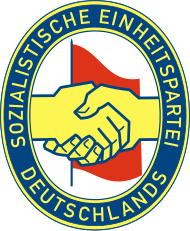
The political leadership of East Germany was distributed between several offices. The Socialist Unity Party of Germany (SED) and its leader held ultimate power and authority over state and government.
Prior to the proclamation of an East German state, the Soviets established the German Economic Commission (DWK) in 1948 as a de facto government in their occupation zone. Its chairman was Heinrich Rau.
On 7 October 1949 an East German state, called the German Democratic Republic (GDR), was proclaimed and took over governmental functions from the DWK, largely with the same leading figures.
Until 1 December 1989, the most important position in the GDR was that of the Leader of the Socialist Unity Party of Germany (SED), first titled chairman from 1946 to 1950, then as the First Secretary between 1950 and 1976 and finally titled General Secretary. The first article of the GDR's constitution contained a section granting the SED a monopoly on power, making the SED's leader the de facto leader of the country. He and the party Politburo, which he headed, set all policy, with both cabinet, state council and parliament acting as a rubber stamp implementing their decisions.
The formal head of state was originally the President of the German Democratic Republic. After the death of incumbent Wilhelm Pieck in 1960, the office was replaced by a collective body as head of state, the State Council. The position of chairman was the de facto head of state and commonly held by the party leader.
The government was headed by the Council of Ministers and its chairman, sometimes colloquially called Prime Minister. However, all the decisions were made by the party, with the cabinet implementing them. Indeed, the SED Central Committee had committees mirroring the cabinet departments.
Other institutions included the Volkskammer, the legislature whose sessions were chaired by a President, and, since 1960, the National Defense Council, which held supreme command of the GDR's armed forces and had unlimited authority over the State in time of war. The Council was composed exclusively of members of the SED's Central Committee and Politburo, with the party leader serving as Chairman of the National Defense Council.
The political landscape was completely changed by the Peaceful Revolution in late 1989, which saw the SED having to relinquish its monopoly on political power in favour of the Council of Ministers, the National Defense Council and the State Council being abolished. The remaining institutions were the People's Chamber, whose President became head of state by default for the remainder of the GDR's existence, and the Council of Ministers, both soon constituted on basis of the country's first and only democratic elections in March 1990. The GDR joined the Federal Republic of Germany on 3 October 1990
| Name (Lifespan) |
Portrait | Period | Congress(es) | Political office | Premier | President | Policies |
|---|---|---|---|---|---|---|---|
| Walter Ulbricht (1893–1973) |

|
25 July 1950 ↓ 3 May 1971 |
First Secretary of the Socialist Unity Party Chairman of the State Council (1960–1973) Chairman of the National Defense Council (1960–1971) First Deputy Chairman of the Council of Ministers(1949–1960) |
Otto Grotewohl Willi Stoph |
Wilhelm Pieck himself |
Stalinism • Construction of Socialism (1950–54) • Farm collectivization (1952–61) • Ten Commandments of Socialist Morality and Ethics (1958–76) • New Economic System (1963–68) • Economic System of Socialism (1968–70) | |
| Ever since the merger of the KPD and SPD, Ulbricht was one of the leading figures in the Socialist Unity Party, largely due to his good relationship with the Soviets. Originally led de jure in parity by former SPD Central Committee Co-Chairman Otto Grotewohl and senile former KPD leader Wilhelm Pieck, Ulbricht was elected First Secretary of the Socialist Unity Party on 25 July 1950, solidifying his leading role of both country and party. | |||||||
| Erich Honecker (1912–1994) |

|
3 May 1971 ↓ 18 October 1989 |
General Secretary of the Socialist Unity Party Chairman of the State Council (1976–1989) Chairman of the National Defense Council |
Willi Stoph Horst Sindermann Willi Stoph |
Walter Ulbricht Willi Stoph himself |
• Unity of Economic and Social Policy (1971–89) • Rapprochement (1971–89) | |
| The failure of Ulbricht's Economic System of Socialism to raise the GDR's economic competitiveness and his bad relationship with new Soviet leader Leonid Brezhnev opened an opportunity for Honecker, formerly Ulbricht's protégé and powerful Central Committee Secretary, to depose him. After assembling a majority of the Politburo against him, he finally received Brezhnev's approval in April 1971, thereafter forcing Ulbricht to resign. | |||||||
| Egon Krenz (1937–) |

|
18 October 1989 ↓ 1 December 1989 |
— | General Secretary of the Socialist Unity Party Chairman of the State Council Chairman of the National Defense Council |
Willi Stoph Hans Modrow |
himself | • Glasnost • Perestroika |
| By the late 1980s, the GDRs economy was in crisis, with the unsustainable debt burden rising every year to finance the country's generous welfare system. By summer 1989, an opposition movement had formed that the ruling class was unable to deal with. In addition, Honecker's health was failing and he became increasingly oblivious to the situation in the country. On 17 October 1989, Egon Krenz, Honecker's protégé and youngest Politburo member, deposed Honecker in the Politburo. Honecker announced his resignation a day later in the Central Committee, citing his failing health, and proposed Krenz as his successor. | |||||||
| Hans Modrow (1928–2023) |

|
1 December 1989 ↓ 12 April 1990 |
— | Chairman of the Council of Ministers | himself | Egon Krenz Manfred Gerlach Sabine Bergmann-Pohl (interim) |
Round Table • Democratization |
| On 7 November 1989, Willi Stoph resigned as Chairman of the Council of Ministers. His replacement, former First Secretary of the Socialist Unity Party in Bezirk Dresden Modrow, stressed his independence towards the SED's leadership upon his election by the Volkskammer on 13 November. After the Volkskammer removed the section in the GDR's constitution guaranteeing their monopoly on political power on 1 December 1989, Modrow became the de facto leader of the GDR, Krenz resigning as head of state a few days later. | |||||||
| Lothar de Maizière (1940–) |

|
12 April 1990 ↓ 2 October 1990 |
— | Minister-President | himself | Sabine Bergmann-Pohl (interim) | German reunification • Privatization |
| The 1990 Volkskammer election, the first and only free elections of the GDR, saw a victory for the Alliance for Germany electoral coalition and chiefly the Christian Democratic Union, led by de Maizière. The Volkskammer elected him as Minister-President on 12 April 1990. | |||||||
Leaders of the Socialist Unity Party of Germany (SED)
| No. | Portrait | Name | Took office | Left office | Time in office | Party | |
|---|---|---|---|---|---|---|---|
| Joint Chairmen of the Socialist Unity Party Vorsitzende der Sozialistischen Einheitspartei Deutschlands | |||||||
| . |
 | Pieck, WilhelmWilhelm Pieck (1876–1960) | 22 April 1946 | 25 July 1950 | 4 years, 94 days | SED | |
| . |
 | Grotewohl, OttoOtto Grotewohl (1894–1964) | 22 April 1946 | 25 July 1950 | 4 years, 94 days | SED | |
| General Secretary of the Central Committee (First Secretary of the Central Committee 1953–1976) Generalsekretär/Erster Sekretär des Zentralkommitees | |||||||
| 1 |
 | Ulbricht, WalterWalter Ulbricht (1893–1973) | 25 July 1950 | 3 May 1971 | 20 years, 282 days | SED | |
| 2 |
 | Honecker, ErichErich Honecker (1912–1994) | 3 May 1971 | 18 October 1989 | 18 years, 168 days | SED | |
| 3 |
 | Krenz, EgonEgon Krenz (born 1937) | 18 October 1989 | 6 December 1989 | 49 days | SED | |
| (Honorary) Chairman of the Central Committee Vorsitzender des Zentralkommitees | |||||||
| 1 |
 | Ulbricht, WalterWalter Ulbricht (1893–1973) | 3 May 1971 | 1 August 1973 † | 2 years, 90 days | SED | |
On 1 December 1989, the People's Chamber removed the section of the East German Constitution granting the SED a monopoly of power—thus ending Communist rule in East Germany. Before the month was out, the SED transformed from a Leninist cadre party into a democratic socialist party, renaming itself first to Socialist Unity Party — Party of Democratic Socialism and later in the same year, to Party of Democratic Socialism (PDS). Hence, the party's subsequent leaders were no more leaders of East Germany than the leaders of other parties.
Heads of state
| No. | Portrait | Name | Took office | Left office | Time in office | Party | |
|---|---|---|---|---|---|---|---|
| President of the Republic Präsident der Republik | |||||||
| – |
 | Dieckmann, JohannesJohannes Dieckmann (1893–1969) Acting | 7 October 1949 | 11 October 1949 | 4 days | LDPD | |
| 1 |
 | Pieck, WilhelmWilhelm Pieck (1876–1960) | 11 October 1949 | 7 September 1960 † | 10 years, 332 days | SED | |
| – |
 | Dieckmann, JohannesJohannes Dieckmann (1893–1969) Acting | 7 September 1960 | 12 September 1960 | 5 days | LDPD | |
| Chairman of the State Council Vorsitzender des Staatsrats | |||||||
| 1 |
 | Ulbricht, WalterWalter Ulbricht (1893–1973) | 12 September 1960 | 1 August 1973 † | 12 years, 323 days | SED | |
| – |
 | Ebert Jr., FriedrichFriedrich Ebert Jr. (1894–1979) Acting | 1 August 1973 | 3 October 1973 | 63 days | SED | |
| 2 |
 | Stoph, WilliWilli Stoph (1914–1999) | 3 October 1973 | 29 October 1976 | 3 years, 26 days | SED | |
| 3 |
 | Honecker, ErichErich Honecker (1912–1994) | 29 October 1976 | 24 October 1989 | 12 years, 360 days | SED | |
| 4 |
 | Krenz, EgonEgon Krenz (born 1937) | 24 October 1989 | 6 December 1989 | 43 days | SED | |
| 5 |
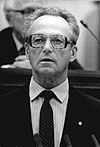 | Gerlach, ManfredManfred Gerlach (1928–2011) | 6 December 1989 | 5 April 1990 | 120 days | LDPD | |
| President of the People's Chamber Präsident der Volkskammer | |||||||
| – |
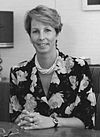 | Bergmann-Pohl, SabineSabine Bergmann-Pohl (born 1946) | 5 April 1990 | 2 October 1990 | 180 days | CDU | |
Heads of government
| No. | Portrait | Name | Took office | Left office | Time in office | Party | |
|---|---|---|---|---|---|---|---|
| Minister-President Ministerpräsident | |||||||
| 1 |
 | Grotewohl, OttoOtto Grotewohl (1894–1964) | 12 October 1949 | 8 December 1958 (office renamed) | 9 years, 57 days | SED | |
| Chairman of the Council of Ministers Vorsitzender des Ministerrats | |||||||
| 1 |
 | Grotewohl, OttoOtto Grotewohl (1894–1964) | 8 December 1958 | 21 September 1964 † | 5 years, 288 days | SED | |
| 2 |
 | Stoph, WilliWilli Stoph (1914–1999) | 21 September 1964 | 3 October 1973 | 9 years, 12 days | SED | |
| 3 |
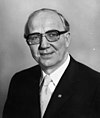 | Sindermann, HorstHorst Sindermann (1915–1990) | 3 October 1973 | 29 October 1976 | 3 years, 26 days | SED | |
| (2) |
 | Stoph, WilliWilli Stoph (1914–1999) | 29 October 1976 | 13 November 1989 | 13 years, 15 days | SED | |
| 4 |
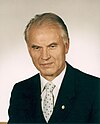 | Modrow, HansHans Modrow (1928–2023) | 13 November 1989 | 12 April 1990 | 150 days | SED PDS | |
| Minister-President Ministerpräsident | |||||||
| 5 |
 | de Maizière, LotharLothar de Maizière (born 1940) | 12 April 1990 | 2 October 1990 | 173 days | CDU | |
Heads of parliament
| No. | Portrait | Name | Took office | Left office | Time in office | Party | |
|---|---|---|---|---|---|---|---|
| President of the People's Chamber Präsident der Volkskammer | |||||||
| 1 |
 | Dieckmann, JohannesJohannes Dieckmann (1893–1969) | 7 October 1949 | 22 February 1969 † | 19 years, 138 days | LDPD | |
| 2 |
 | Götting, GeraldGerald Götting (1923–2015) | 12 May 1969 | 29 October 1976 | 7 years, 170 days | CDU | |
| 3 |
 | Sindermann, HorstHorst Sindermann (1915–1990) | 29 October 1976 | 13 November 1989 | 13 years, 15 days | SED | |
| 4 |
 | Maleuda, GüntherGünther Maleuda (1931–2012) | 13 November 1989 | 5 April 1990 | 143 days | DBD | |
| 5 |
 | Bergmann-Pohl, SabineSabine Bergmann-Pohl (born 1946) | 5 April 1990 | 2 October 1990 | 180 days | CDU | |
Heads of the military
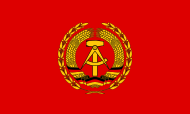
| No. | Portrait | Chairman of the National Defence Council Vorsitzender des Nationalen Verteidigungsrates |
Took office | Left office | Time in office | Party | |
|---|---|---|---|---|---|---|---|
| 1 |
 | Ulbricht, WalterWalter Ulbricht (1893–1973) | 10 February 1960 | 3 May 1971 | 11 years, 82 days | SED | |
| 2 |
 | Honecker, ErichErich Honecker (1912–1994) | 3 May 1971 | 18 October 1989 | 18 years, 168 days | SED | |
| 3 |
 | Krenz, EgonEgon Krenz (born 1937) | 18 October 1989 | 6 December 1989 | 49 days | SED | |
See also
- List of German monarchs
- President of Germany
- President of Germany (1919–1945)
- List of presidents of Germany
- Chancellor of Germany
- List of chancellors of Germany
Notes
- Titled General Secretary until 1953
- "Deputy Minister-President" until 24 November 1955, then "First Deputy Minister-President" until 8 December 1958
- Honecker held the same position under the title of First Secretary until 1976
- On 5 April 1990, the State Council was abolished and its responsibilities were transferred to the Presidium of the People's Chamber, with the President of the latter body serving as interim Head of state.
References
External links
| General Secretaries of the Socialist Unity Party (SED) | |
|---|---|
| Heads of state of the German Democratic Republic | ||
|---|---|---|
| President | ||
| Chairmen of the State Council | ||
| President of the People's Chamber | ||
| Heads of government of the German Democratic Republic | ||
|---|---|---|
| Minister-President | ||
| Chairmen of the Council of Ministers | ||
| Minister-President | ||
| Presidents of the Volkskammer of the German Democratic Republic | ||
|---|---|---|
